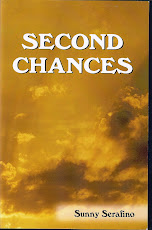Whenever I hold a book signing, or give a speech featuring some of my work, I'm asked the same questions. "Where do you get your ideas?" and "How do you get started?"
Writing is such an individual occupation. You really can't get help with either of those questions. The ideas have to come to you, either through something that triggers the thoughts, an over-heard conversation, or an incident that the author thinks can be fictionalized. Beginning the novel comes after the original thoughts are set. Some of my books are based on facts, either from things in my life or others that I have known. Of course, whatever starts the thought process is never factually transferred into my books. That's not fiction. The spark is true but the fire you build with it is pure fiction and that's the way it should be.
I honestly don't know where A Grandma for Christmas came from but it was pure pleasure to write that book…and…it took first place in the 2008 Royal Palm Literary Awards sponsored by the Florida Writers Association. The plot certainly wasn't from my life. I remember driving along one day and thinking about women who are in relationships with married men and what would happen if, after a long time, they just said, "No. I'm not going on with the broken promises, the sneaking about and the lonely holidays." (Where that came from I couldn't tell you) I thought if it had been a very long relationship it wouldn't be an easy choice to make. But the decision would show long-overdue courage and that's what I write about—courageous women. A Grandma for Christmas was born.
Now that I had the initial thought the next thing was to figure out what to do with it. I didn't want to get into the nitty-gritty of the failed affair. She's calling it quits and needs to get away. That, in itself, isn't much of a story. But, ah ha, what if she always wanted a child and now her biological clock is ticking down. There's a thought that I took and ran with. It was time for my 'What if' tactics. 'What if' is what I apply to many things in the course of writing a novel. "What if they do this; or don't do that." "What if I make the guy meaner and the gal gutsier." Trial and error play a big part in coming to decisions as you work. Sometimes as the work progresses I am amazed at the turn of events as they unfold.
Once the basic plot is set the whole book lays open before you—but there are lots of blank pages and my job as an author is to fill them with the rest of the story. I know from experience that other characters will appear as you write; plot changes will come with the addition of those characters and sometimes the original plot will take a turn that I didn't even contemplate.
The basics of a novel are plot, characters, conflict, solutions and action. There are no rules, in fact W. Somerset Maugham once was quoted as saying, "There are three rules for writing a novel. Unfortunately, no one knows that they are." Ah, Mr. Maugham, how wise you were. But if there are no rules there are basics and that is what I teach when I hold seminars, workshops and classes on creative writing. I do know that there must be a beginning, a middle and an end and there has to be conflict, otherwise the book is just too goody-two-shoes and ends up dull, dull, dull.
I love writing. I love teaching writing. And, I love mentoring those who genuinely want to improve their writing.
Monday, April 6, 2009
An Anatomy of a Novel
Labels:
authors,
Books,
Courageous Women,
Inspirational,
Motivational,
Readers
Subscribe to:
Post Comments (Atom)












No comments:
Post a Comment